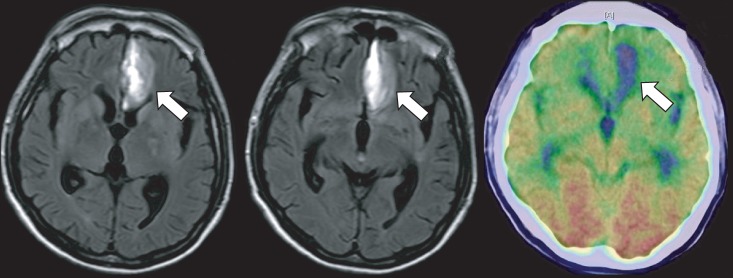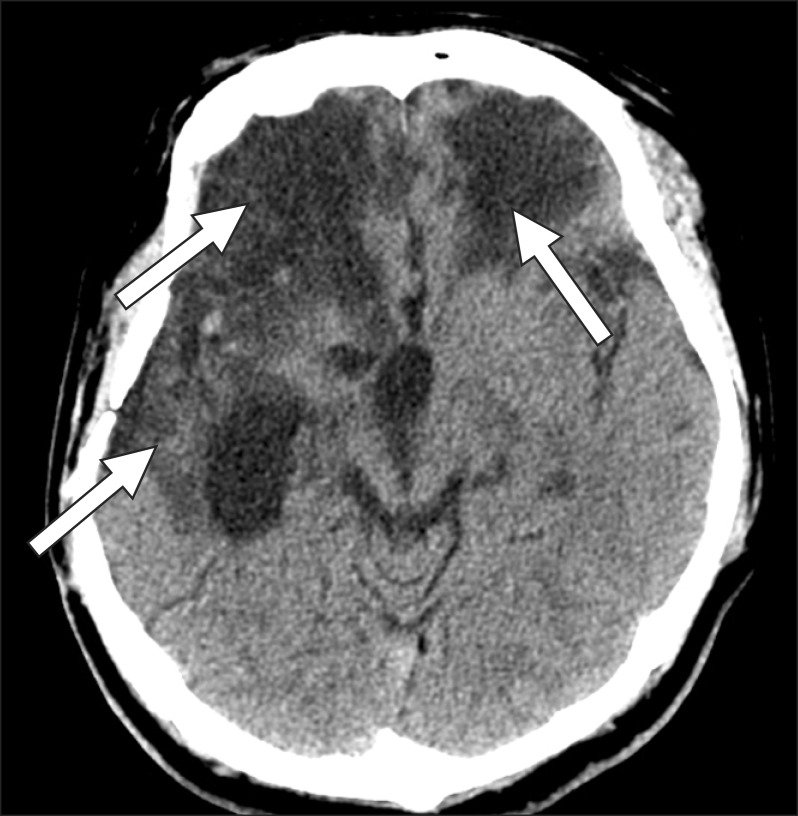Ann Rehabil Med.
2013 Dec;37(6):871-874. 10.5535/arm.2013.37.6.871.
Trial of Oral Metoclopramide on Diurnal Bruxism of Brain Injury
- Affiliations
-
- 1Department of Rehabilitation Medicine, Yonsei University College of Medicine, Seoul, Korea.
- 2Department of Physical Medicine and Rehabilitation, National Health Insurance Corporation Ilsan Hospital, Goyang, Korea. rekhs@nhimc.or.kr
- KMID: 2266566
- DOI: http://doi.org/10.5535/arm.2013.37.6.871
Abstract
- Bruxism is a diurnal or nocturnal parafunctional activity that includes tooth clenching, bracing, gnashing, and grinding. The dopaminergic system seems to be the key pathophysiology of bruxism and diminution of dopaminergic transmission at the prefrontal cortex seems to induce it. We report two patients with diurnal bruxism in whom a bilateral frontal lobe injury resulted from hemorrhagic stroke or traumatic brain injury. These patients' bruxism was refractory to bromocriptine but responded to low-dose metoclopramide therapy. We propose that administering low doses of metoclopramide is possibly a sound method for treating bruxism in a brain injury patient with frontal lobe hypoperfusion on positron emission tomography imaging.
Keyword
MeSH Terms
Figure
Cited by 2 articles
-
Seven Cases of Successful Remission after Trial of Metoclopramide on Orofacial Dyskinesia of Stroke Patients: a Case Series
Myeong Hwan Bang, Jiseong Hong, Hyoung Seop Kim
Brain Neurorehabil. 2018;11(1):. doi: 10.12786/bn.2018.11.e3.Trial of Metoclopramide on Oro-facial Dyskinesia Following Traumatic Brain Injury: A Case Report
Seung Ki Kim, Joon Yeop Kim, Hyoung Seop Kim
Brain Neurorehabil. 2014;7(2):147-150. doi: 10.12786/bn.2014.7.2.147.
Reference
-
1. Lavigne GJ, Khoury S, Abe S, Yamaguchi T, Raphael K. Bruxism physiology and pathology: an overview for clinicians. J Oral Rehabil. 2008; 35:476–494. PMID: 18557915.
Article2. Chen WH, Lu YC, Lui CC, Liu JS. A proposed mechanism for diurnal/nocturnal bruxism: hypersensitivity of presynaptic dopamine receptors in the frontal lobe. J Clin Neurosci. 2005; 12:161–163. PMID: 15749418.
Article3. Seraidarian P, Seraidarian PI, das Neves Cavalcanti B, Marchini L, Claro Neves AC. Urinary levels of catecholamines among individuals with and without sleep bruxism. Sleep Breath. 2009; 13:85–88. PMID: 18516634.
Article4. Bannon MJ, Roth RH. Pharmacology of mesocortical dopamine neurons. Pharmacol Rev. 1983; 35:53–68. PMID: 6138783.5. Areso MP, Giralt MT, Sainz B, Prieto M, Garcia-Vallejo P, Gomez FM. Occlusal disharmonies modulate central catecholaminergic activity in the rat. J Dent Res. 1999; 78:1204–1213. PMID: 10371243.
Article6. Arnsten AF. Catecholamine regulation of the prefrontal cortex. J Psychopharmacol. 1997; 11:151–162. PMID: 9208378.
Article7. Lobbezoo F, Lavigne GJ, Tanguay R, Montplaisir JY. The effect of catecholamine precursor L-dopa on sleep bruxism: a controlled clinical trial. Mov Disord. 1997; 12:73–78. PMID: 8990057.8. Alander T, Anden NE, Grabowska-Anden M. Metoclopramide and sulpiride as selective blocking agents of pre- and postsynaptic dopamine receptors. Naunyn Schmiedebergs Arch Pharmacol. 1980; 312:145–150. PMID: 7402361.9. Winocur E, Gavish A, Voikovitch M, Emodi-Perlman A, Eli I. Drugs and bruxism: a critical review. J Orofac Pain. 2003; 17:99–111. PMID: 12836498.
- Full Text Links
- Actions
-
Cited
- CITED
-
- Close
- Share
- Similar articles
-
- Trial of Metoclopramide on Oro-facial Dyskinesia Following Traumatic Brain Injury: A Case Report
- Bruxism Secondary to Hypoxic Brain Injury Treated With Botulinum Toxin-A
- Effect of Botulinum Toxin A on Bruxism after Brain Injury
- Implant complications in bruxism patients
- Bruxism and Oromandibular Dystonia after Brain Injury Treated with Botulinum Toxin A and Occlusal Appliance: A Case Report



